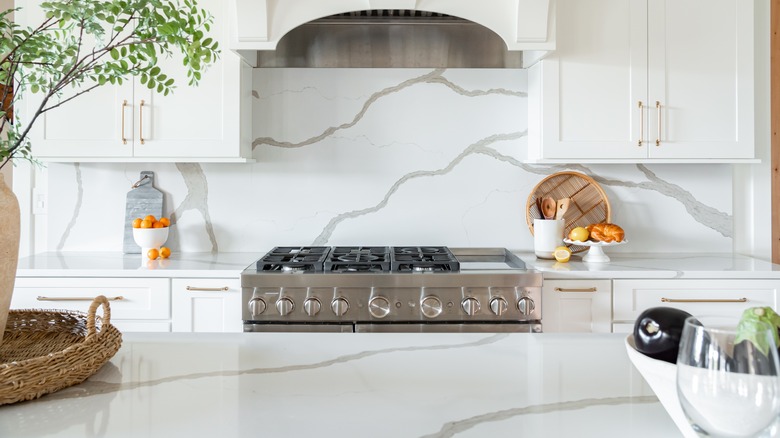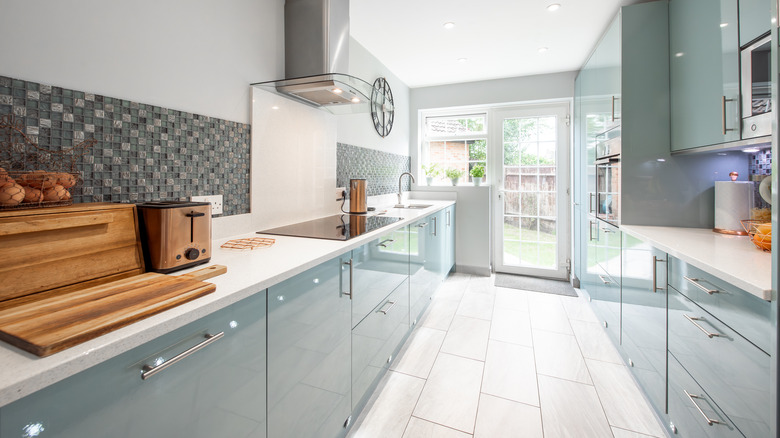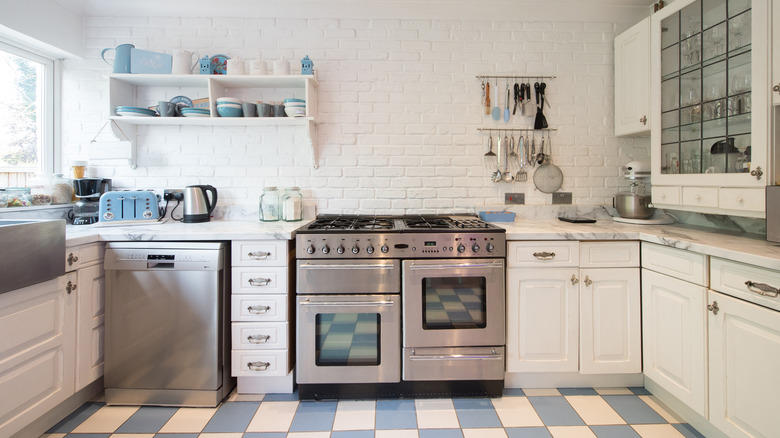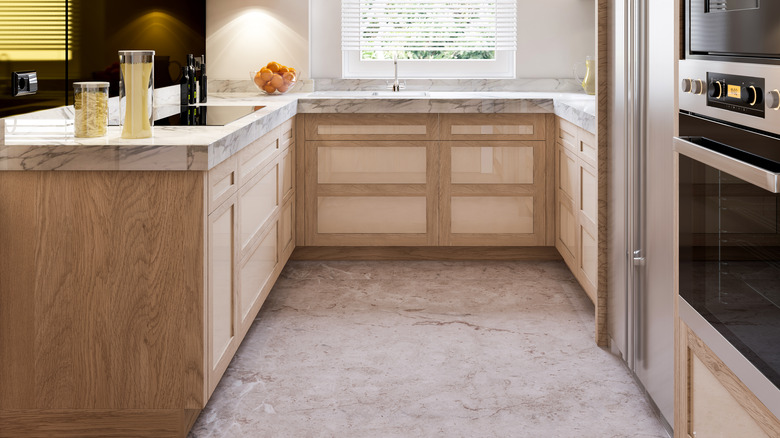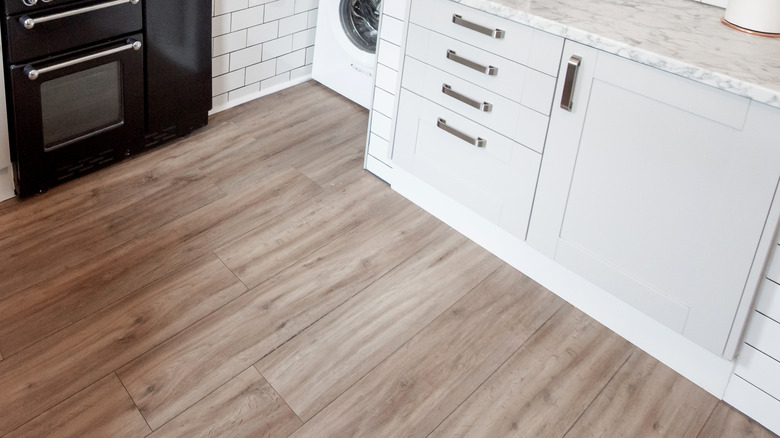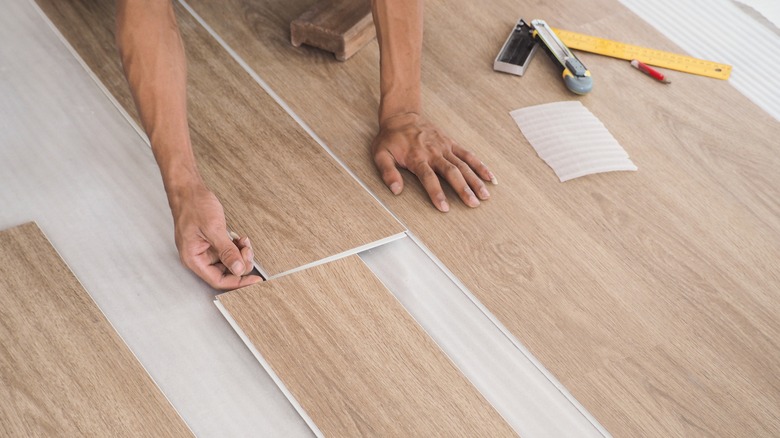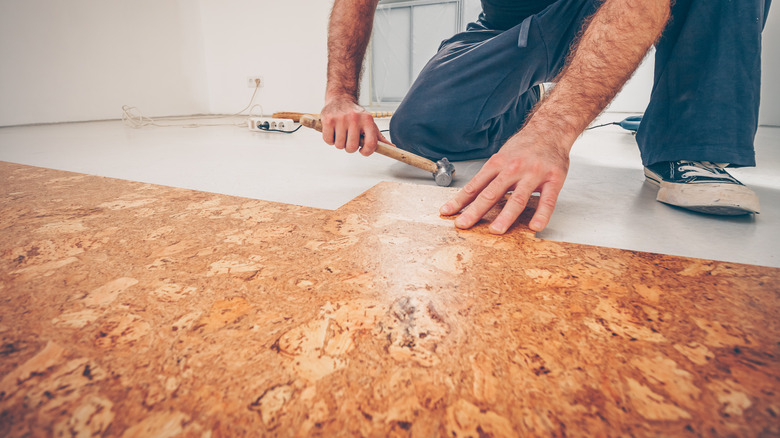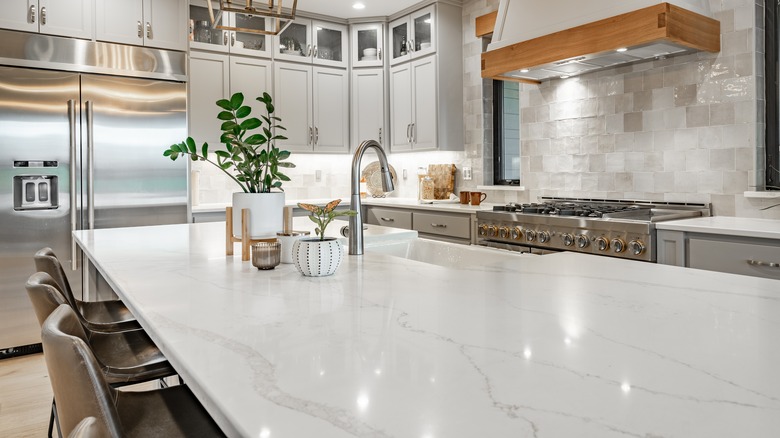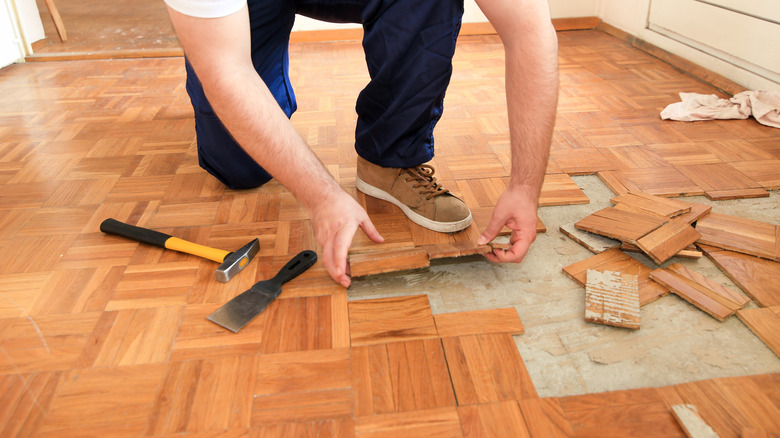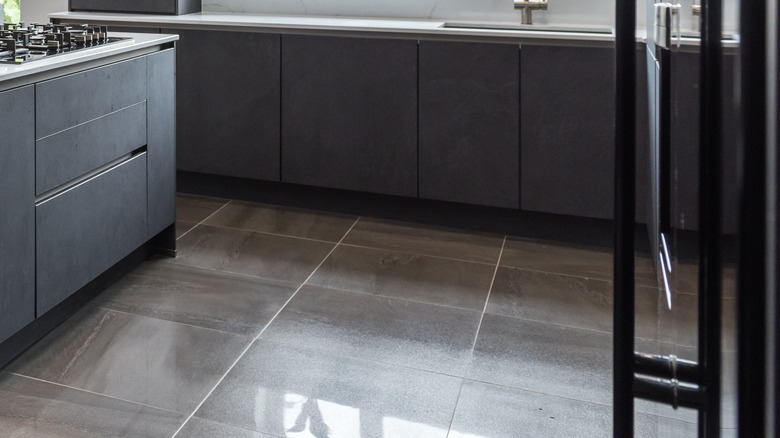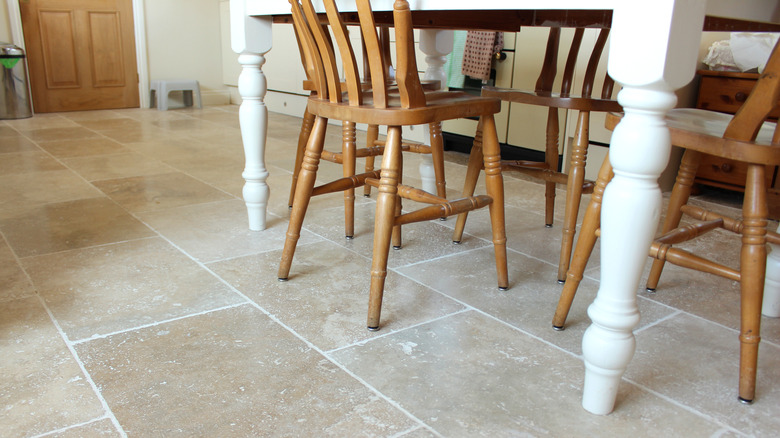6 Kitchen Floor Types That Look Beautiful With Quartz Countertops (& 4 To Avoid)
Kitchen remodels can be an expensive undertaking — in fact, they're one of the priciest rooms to renovate. Quartz countertops also aren't cheap, but they require far less fussing and maintenance compared to natural stone. Besides being practical, quartz is also a beautiful, high-end material. So, once you've finally settled on quartz for your counters, you'll want to pick the most complimentary flooring option. This ensures you won't have to undertake any design redos or have reno regrets down the line. Yet how can you determine what the best flooring options for your kitchen really are? Is it the same for everyone with every budget, or are there certain selections that always come out on top, no matter what? In this House Digest exclusive, we spoke with experts across the construction, design, and decoration spaces to find out once and for all.
The good news is that these experts have identified six flooring options that pair perfectly with quartz countertops, and only four that you need to stay away from. This variety ensures that, no matter what your budget or style for the project is, you have a range of stunning flooring materials to choose from, all of which will complement those classy quartz counters.
Good: Porcelain or ceramic tile can complement any color
Quartz countertops can come in many different colors. To make sure you have a flooring choice that can keep up with them, our experts recommend both porcelain or ceramic tile for their design versatility. "Available in endless sizes, patterns, and colors, porcelain or ceramic tile is a wonderful companion to quartz countertops," Erika Dale, interior designer and founder of Erika Dale Interior Design, told House Digest in an exclusive interview. "You can lean more contemporary with something sleek and clean, or opt for a natural stone tile look for an old-world charm, making it extremely versatile for any design aesthetic."
Tiling is a great choice for kitchens overall because if installed correctly, it tends to be water-resistant, which is important in an environment where food spills, moisture, and mopping are a given. You don't want to worry about damaging your floors if you get them a little bit wet while cooking dinner or washing dishes. If you decide to plump for porcelain or ceramic tiles, make sure you select ones with a "Ramp Test" rating (a measure of slip resistance) of R10 for your kitchen. You'll also want to investigate the differences between ceramic and porcelain tiles so you can pick an option that's best suited to your budget and lifestyle.
Avoid: Busy patterned tiles that can clash too easily
While tiling is sometimes a great choice in the kitchen because it's water-resistant and easier to keep clean, you have to be careful about the type that you choose. "Tiles with intricate or bold patterns can clash with the subtle elegance of quartz countertops," Darren, a flooring expert from ElmWood Flooring in Chicago, told House Digest in an exclusive interview. "If your quartz features a distinct pattern or color, busy patterned tiles can overwhelm the space and disrupt the overall harmony."
Instead, when selecting tile for your kitchen floor, you should gravitate toward subtle colors and simple designs — or better yet, no designs at all. If you want the main character in your kitchen to be your luxurious quartz countertops, even arranging plain white tiles in something like a modern herringbone pattern can be too visually overwhelming. In this case, it's best to stick with simple, uniformly shaped tiles — or pick another material altogether. If you're really itching to inject charm into your floors with busy motifs, or want to add pattern with grout lines by installing penny tiles, then you should consider a paired back, plain quartz that doesn't feature bold faux veining.
Good: Natural stone flooring completes the luxurious look
Picking the right kitchen flooring can be tough when you have quartz countertops, but Dale thinks that "natural stone floors, such as marble, elevate a design to true luxury." You don't want to undercut the hard work your countertops are doing by making everyone walk on a kitschy-looking floor.
Instead, the key to a winning combination is the color and tone of the stone flooring you choose. "Pair them with a complementary but contrasting quartz selection rather than try to match the organic, one-of-a-kind pattern of the stone, to avoid having the quartz look artificial in comparison," Dale advised. This means that if your marble flooring has a distinct gray swirl, for example, attempting to recreate the same swirl in the countertops will be nearly impossible, highlighting that it's man-made. Instead, opt for a solid color, or a different pattern altogether. Dale believes this choice can create more visual variety and help elevate the look of your entire kitchen. Another fail-safe combo can be pairing light and dark selections together. For instance, dark and moody quartz countertops can make a bold (yet harmonious) contrast with pale marble floors.
Avoid: Laminate flooring since it's cheap and prone to damage
One of the worst things you can do after installing quartz countertops is pair them up with a really low-quality flooring material. This can make your kitchen look lopsided and visually confusing. "I'd avoid laminate in the kitchen, especially with quartz countertops, because it can look cheap next to the elegance of quartz," Veiko Kallas, interior designer at JALG, told House Digest exclusively.
Yet that's not the only reason to avoid the out-of-style flooring option. It's not the easiest material to take care of, either. "Laminate is also prone to water damage, which is a risk in a kitchen environment," Kallas continued. "If the flooring starts to swell or bubble, it won't just clash with your beautiful countertops — it'll also be a hassle to replace." Even though laminate tends to be relatively inexpensive to install, if you have to replace it within a few years, or look at worn flooring all day every day — the repair costs will quickly surpass any savings from choosing it in the first place.
There are, of course, exceptions to every rule. If you only use your kitchen lightly, and choose a premium laminate product, it might hold up for longer. However, premium options that have more realistic designs (rather than obviously printed-on patterns) are close in price to LVP, which, as you'll see below, is a designer-approved choice, and also happens to be waterproof.
Good: LVP is a low-maintenance, chic option
If you want a flooring option that's chic and affordable to complement your quartz countertops, our experts recommend reaching for luxury vinyl planking, or LVP for short. "LVP is a fantastic option if you want the look of wood or stone without the maintenance," Kallas advised. "It pairs well with quartz because it comes in so many styles and colors that you can easily find one that matches your countertops." This way, you can add visual value to your kitchen without clashing with the main event — your beautiful countertops. "The subtle patterns and textures in LVP can add a bit of depth and interest without overpowering the quartz," Kallas continued.
Unlike other flooring choices, LVP is "also durable and water-resistant," Kallas said. This means it's a great choice for the kitchen because it won't warp, bubble, or crack like laminate might. You can be sure you'll have a chic option that matches the luxury of quartz countertops without adding too much to the price tag, as the average cost (including installation) per square foot is roughly $4 to $6. You can also bring this cost down to between $2 and $3 with a DIY install. While there are some mistakes to avoid when installing vinyl plank flooring, it is a relatively achievable project that doesn't require power tools. For instance, while a laminate tile cutter can speed up the process, you can also cut vinyl planks with a utility knife.
Avoid: Cork is soft, sensitive to moisture, and can clash with quartz
There are certain materials that aren't good matches for wet spaces like the kitchen and bathroom, no matter what kind of countertops you have. Cork is one of them. "Cork can dent and scratch easily," Kallas said. "And it's sensitive to moisture, which isn't ideal for a kitchen." One dropped can of soup could mean a sizable dent in a cork floor, which isn't worth it — quartz countertops or not.
Still in doubt as to whether or not cork flooring is a good choice for your kitchen? In addition to being soft and susceptible to moisture, cork also isn't aesthetically suited to quartz. "While cork has its benefits, like being soft underfoot, it's not the best match for quartz," Kallas warned. "The natural, somewhat rustic look of cork doesn't always pair well with the sleek and modern appearance of quartz, creating a mismatch in styles that can make the space feel disjointed." If you want to bring a touch of rustic charm into your kitchen, consider adding open shelving or splurging on a farmhouse sink, which are often associated with the style, but won't visually ruin your countertops. If you were attracted to cork because of worries about the space looking or feeling cold, kitchen runners can add warmth and comfort, and décor made out of natural materials like wood and rattan can introduce visual softness.
Good: Classic hardwood flooring can add warmth to quartz countertops
Hardwood floors are a classic and there is a great reason for this: They work with almost everything. "The natural warmth and texture of hardwood create a beautiful contrast with the sleek, polished look of quartz," Janice Page, a Certified Kitchen Designer (CKD) and Owner of PKsurroundings told House Digest in an exclusive interview. "It brings balance to modern kitchens, adding warmth and character." So if you are afraid that a slab of bright quartz might be a bit too stark, consider adding a touch of classic coziness with wooden flooring.
A quick tip: Because kitchens tend to house plenty of liquids, those installing hardwood should go the extra mile to make the material water-resistant. This can be completed by the installation contractor, or as a DIY after the fact. Simply coat the floors in a urethane waterproofing sealant (oil- or water-based will both do the trick) for best results. This way, you can prevent the warping that hardwood tends to do when it gets too wet. However, even with a urethane sealant, you shouldn't leave puddles of water standing. And while there are many easy ways to clean hardwood floors, you should be careful not to use an overly wet mop on them.
Avoid: Highly textured flooring, since it will be too overwhelming
You don't want a kitchen that looks like you've just slammed a bunch of different styles together. To prevent this mismatch, our experts recommend avoiding flooring that could be too garish when combined with quartz. "Flooring with excessive texture, such as certain rustic or hand-scraped wood types, can create a visual imbalance with the smooth, refined surface of quartz," said Darren. "Choosing smoother flooring options will better complement the clean lines and elegance of quartz countertops."
If you like rustic elements, consider bringing them into your kitchen with heavy wooden furniture like a sideboard or a kitchen table instead of flooring. You can also add rustic drawer pulls on your cabinets, and incorporate texture through things like baskets and handmade ceramics. These smaller accents can still hint at the warmth and coziness of rusticity without fully committing to what Darren considers to be a fashion faux pas. Plus, these elements can be more easily swapped out if your tastes ever change. Redoing a flooring mistake is significantly more expensive, and can run you between $1,500 to $4,500 in installation costs alone.
Good: Slate is a versatile stone that can pair perfectly with quartz
Selecting the right flooring choice is about two main things: function and style. Yet when choosing between multiple options that could work, aesthetics always have the final word. For Giovanni Scippo, Designer and Director at 3D Lines, slate is a guaranteed winner when combined with quartz. "Slate floors add a rich, textured look that contrasts nicely with the smooth surface of quartz," he told House Digest exclusively. "The earthy tones — like gray and rust — bring warmth and rustic style to the kitchen. Plus, the natural variations in the slate make the space feel balanced and visually interesting."
In addition to these natural variations in coloring, slate flooring also comes in different shapes, styles, and finishes. You might choose large square tiles of the material, or many small pieces of the stone laid out in a mosaic — provided you're not pairing this more busy look with a very bold design in your quartz countertops. It's also very durable, which is a perfect choice for a high-traffic area like a kitchen. However, keep in mind that real slate tiles, like a lot of other natural stone finishes that are slightly porous, need to be sealed annually. This will protect the stone from stains and water-marks. As with hardwood, you'll want to wipe up spills quickly and not leave water standing.
Good: Travertine flooring is a timeless neutral option
Travertine is one of the world's oldest building materials, even being found in the Roman Colosseum. It's a form of limestone that is durable, stylish, easy to clean, and endlessly classic — as humans have been decorating with it for thousands of years. For all these reasons and more, our experts think it's the perfect complement to your quartz countertops. "Travertine flooring pairs well with quartz thanks to its soft, neutral colors like beige and cream," said Scippo. "These warm tones blend effortlessly with different shades of quartz, and the stone's porous texture adds depth and dimension. The classic travertine look balances nicely with the polished finish of quartz, making the space feel both modern and inviting."
Like many of the other recommended options, Travertine comes in a range different colors and patterns from subtle to bold. Scippo recommends keeping to softer, more muted varieties so as to not overwhelm the countertops. If your quartz has lots of swirls or veining, be sure not to choose a travertine tiling option that is too similar so as to avoid a look that's overly matchy-matchy. Instead, the balance comes from the visible differences between the two. Although it's a timeless natural material (which also happens to be trending), travertine tiles are slightly more affordable than options like granite and marble. However, you can still expect to pay between $5 and $15 per square foot (before installation). As with hardwood, the best way to clean your travertine flooring is with vacuuming, sweeping, gentle products, and a well-wrung-out mop.
